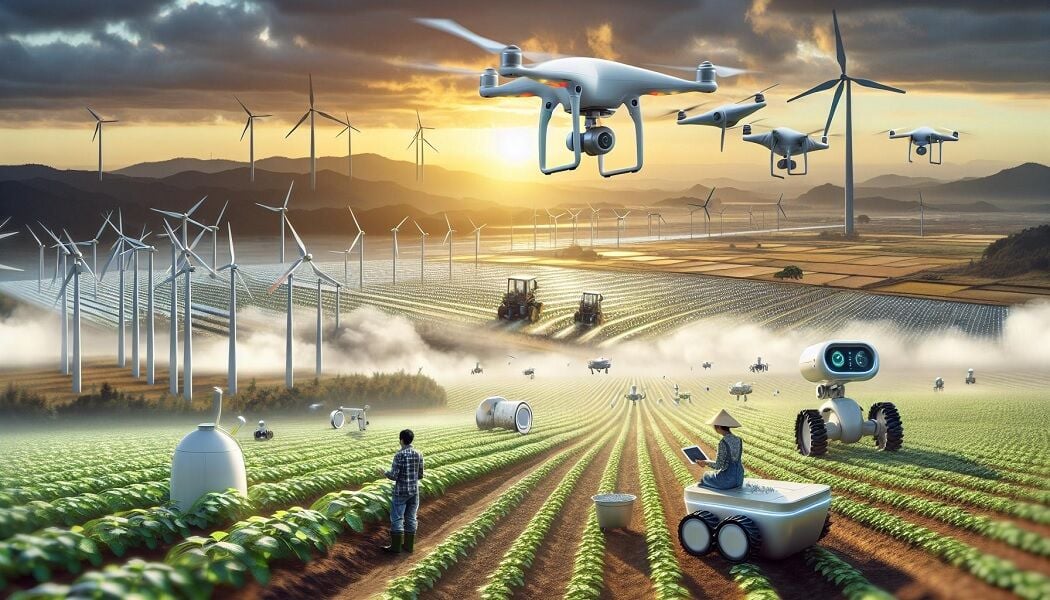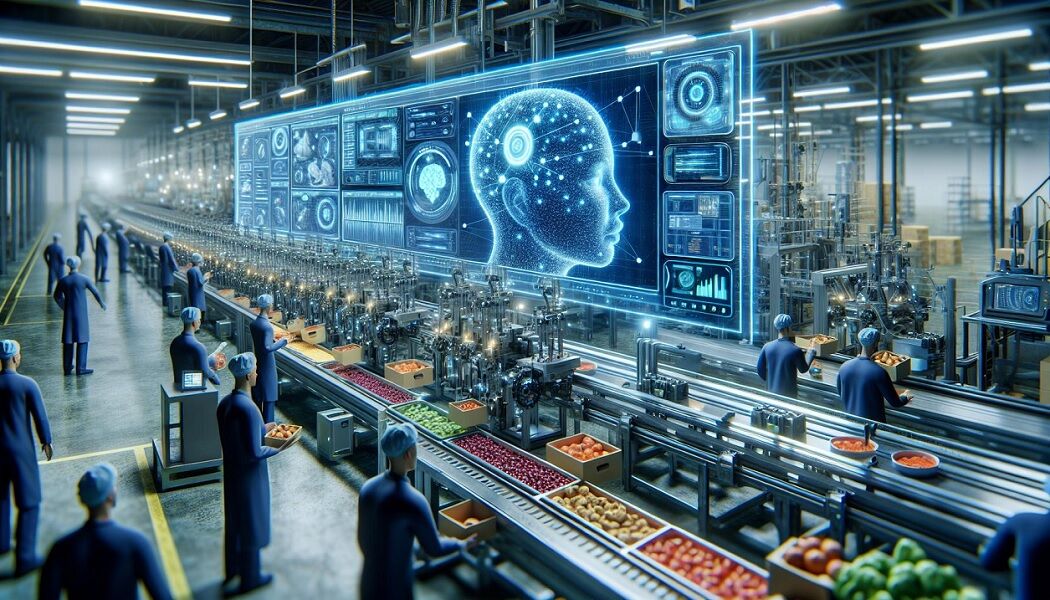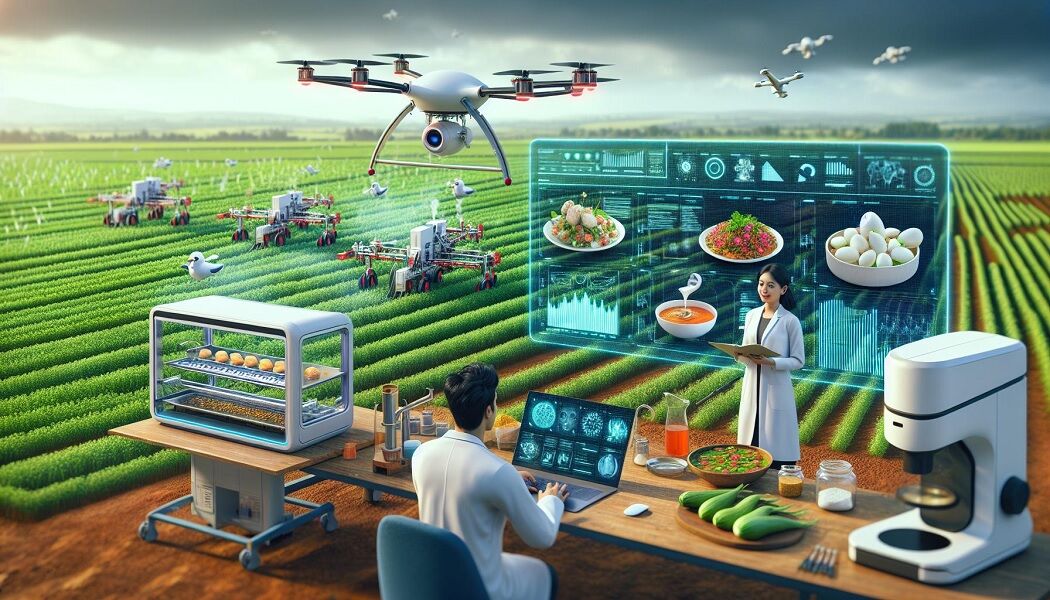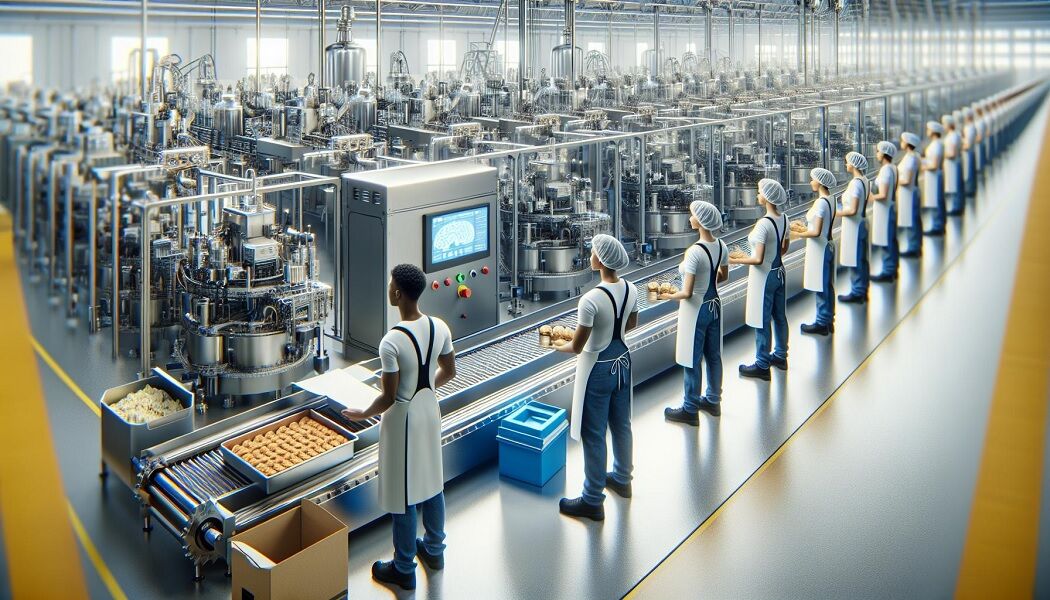How AI revolutionises your food: From farm to fork

In the fast-paced world of food innovation and production, Artificial intelligence (AI) is no longer just a buzzword; it’s a game changer. From enhancing the quality of your morning cereal to ensuring the sustainability of your favourite snacks, AI’s role is both profound and transformative.
Imagine a world where food waste is significantly reduced, and every product on your plate meets the highest quality standards. That’s the reality AI is creating in the food industry today. It’s not just about making processes faster; it’s about making them smarter, safer, and more consumer-centric. Let’s dive into how AI is revolutionizing the way we grow, process, and enjoy food.
The role of AI in food innovation and production
Embracing AI food innovation and AI in food production has revolutionized the way you experience food from field to table. This innovative technology has become integral in making the food industry smarter, safer, and more aligned with your needs.

AI plays a pivotal role in streamlining production lines. By employing machine learning algorithms, factories are now capitalizing on enhanced quality control measures. These systems quickly identify defects or contaminants, ensuring only the highest quality products make it to your plate. Moreover, AI-driven automation has taken over repetitive tasks such as sorting, packaging, and labelling. This shift not only boosts efficiency but significantly lowers the chance of human error, enhancing food safety.
Beyond production, AI’s influence extends to preventative machinery maintenance. Predictive algorithms monitor equipment health, foresee potential breakdowns, and schedule repairs before issues escalate. This proactive approach reduces downtime, maintaining a steady production flow to meet your demands.
Innovation in food technology AI doesn’t stop at manufacturing. It’s shaping how new foods are conceived, offering rapid prototyping and optimizing formulas to meet specific dietary preferences or nutritional requirements. Through real-time monitoring and data analysis, AI ensures these products adhere to stringent food safety standards while paving the way for groundbreaking food items tailored to your tastes and health needs.
As AI continues to evolve, the food industry is clearly on the cusp of a major transformation. With a commitment to quality, safety, and innovation, AI is not just changing the game—it’s redefining it, ensuring every step from the farm to your fork is smarter, safer, and perfectly suited to your lifestyle.
Benefits of AI in the food industry

Improved efficiency
When you dive into AI food innovation, one of the first benefits that leaps out is the dramatic boost in efficiency. AI-driven systems in food production don’t just work faster; they work smarter. Machine learning algorithms take the guesswork out of optimizing production lines, allowing for real-time adjustments that keep operations humming at peak performance. For example, AI can fine-tune the baking time in a bread factory to ensure every loaf comes out perfectly, every time. This isn’t just about speed—it’s about using resources more effectively and reducing waste, which is key in today’s environmentally conscious world.
Enhanced quality control
Another major advantage of incorporating AI in food production is the significant upgrade in quality control. Food technology AI isn’t prone to the lapses in concentration or judgment humans can sometimes have. With AI, every product is scanned with relentless precision, identifying and removing any item that doesn’t meet the strict criteria set by safety standards. This isn’t just about catching a misshapen biscuit. It’s about scanning for contaminants invisible to the human eye, ensuring what ends up on consumers’ plates is not only delicious but, more importantly, safe. In the highly regulated food industry, AI’s role in maintaining quality isn’t just beneficial—it’s transformative, pushing standards to levels previously imagined impossible.
Challenges of implementing AI in food production

When integrating AI into food production, you’re embarking on a transformative journey with AI food innovation. However, the path isn’t without its obstacles. Let’s dive into two major hurdles that companies face: the cost of setting everything up and ensuring data remains secure.
Cost of implementation
Rolling out AI within your food production processes demands a significant financial outlay. Initial investments into AI technology and food technology AI can pose a daunting challenge, particularly for small and medium-sized enterprises (SMEs). The transition from conventional methods to AI-driven systems isn’t just about adopting new technology; it comes with a need for a thorough overhaul of existing infrastructure, which can be both disruptive and costly.
Another critical factor is training your workforce. AI in food production brings a new era of efficiency and innovation, but it also requires employees who can navigate these advanced systems. Finding and nurturing talent with the right blend of tech-savvy and understanding of food production nuances means extra investment in training programs and possibly new hires.
Data security concerns
As you incorporate AI-driven solutions into your operations, safeguarding sensitive data becomes paramount. The vast amounts of information collected and processed by AI systems in food technology AI applications include proprietary data on food recipes, supply chain logistics, and customer information. Ensuring this data doesn’t fall into the wrong hands is crucial.
Implementing stringent security measures is non-negotiable. Advanced encryption techniques, rigorous access control, and ongoing security assessments form the backbone of a robust defence against breaches and unauthorized access. Also, staying compliant with evolving data protection regulations is essential to avoid potential legal pitfalls.
Navigating these challenges requires a strategic approach and an understanding that the journey towards fully leveraging AI in food innovation and production is a marathon, not a sprint. With careful planning and the right investments in technology and your team, you can turn these hurdles into stepping stones toward transforming your food production processes.
Future applications of AI in food innovation

As you delve into the world of AI food innovation, it’s clear that the horizon is brimming with opportunities. Artificial Intelligence is not just a buzzword but a transformative force in food technology AI, poised to revolutionize how we produce, process, and perceive our food.
AI in food production is stepping into uncharted territories, promising to deliver unprecedented efficiency and creativity. Imagine smart farms where AI-driven drones monitor crop health, adjusting water and nutrient levels in real-time for optimal yield. Or consider AI-powered robots meticulously sorting and packaging products with precision, reducing waste and ensuring quality.
Moreover, food technology AI holds the key to personalizing nutrition. With AI, you can expect to see systems that analyze your dietary preferences and nutritional requirements, suggesting or even creating meals tailored specifically to your needs. This isn’t just about convenience but about fostering a healthier society, with AI at the helm, guiding our food choices.
In the lab, AI accelerates the development of new food products. By analyzing vast datasets on consumer preferences, nutritional values, and sustainability metrics, AI helps innovators craft foods that are delicious, nutritious, and eco-friendly. This means you’ll see more plant-based alternatives that taste just like the real thing, all thanks to AI’s ability to pinpoint the exact flavours and textures consumers desire.
As AI continues to evolve, its applications in food innovation and production will only grow more diverse and impactful. From reducing food waste through better demand forecasting to enhancing food safety by quickly identifying contamination, AI is set to redefine our food system.
Stay tuned to how AI reshapes the landscape of food technology. The future promises to be a fascinating journey, with AI leading the charge in creating a more efficient, sustainable, and personalized food experience. The potential is limitless, and the journey has only just begun.
In Thailand, sustainable farming practices are gaining momentum as a means to ensure food security, protect the environment, and support rural communities. These practices include the adoption of integrated pest management (IPM) to reduce chemical pesticide use, the implementation of agroforestry systems that blend crops with trees to enhance biodiversity, and the promotion of organic farming methods that prioritize natural processes and materials. In addition, water conservation techniques such as drip irrigation are being employed to maximize efficiency in water use.
Parts of this article, including images, may have been generated using AI tools before an editor reviewed it.

































